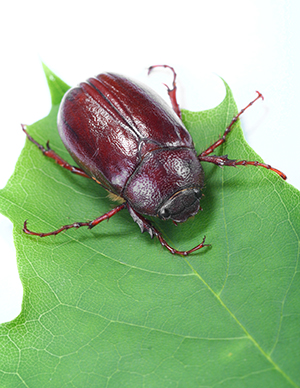 By Mervet Adams, Health Alliance
By Mervet Adams, Health Alliance
I love the longer days of this season, and lately, I’ve found myself unwinding by sitting on my porch and watching the daylight turn into dark. As I kick back, relax, and look up at the night sky, I notice my outdoor light seems to be a bit busier than usual.
What’s all the buzz about? Why, it’s June bug season! Did you know that mid to late June is their mating time? From my angle, they seem to be drawn more to my porch light and siding than to each other.
What exactly does a June bug do? Well, the good news is that June bugs are harmless to people and our pets. They are simply drawn to light and make hideous hissing sounds, but for our plants and shrubs, these little scarabs can be quite harmful after they lay their eggs in the soil. My first thought is, “Get the pesticides out tomorrow!” Then I sit a bit longer and ponder quite the opposite. Pesticides are good news for our affected plants and shrubs but maybe not such good news for me, my elderly neighbors, or their dog (and not to mention the June bugs).
As we get older, our skin gets thinner, and this allows the pesticides to enter the body more easily. Our nervous systems change as well, and we may not notice changes in our surroundings through our sense of smell, touch, and taste. This makes our response time slower and may make exposure to pesticides longer. Older adults may be more likely to have health problems after being exposed to pesticides. Pesticides may speed up damage of the liver or kidneys due to overexposure, and the longer a pesticide stays in the body, the more likely that damage occurs.
Another thing to think about before you decide to spray is whether or not you are on prescription drugs. People who take prescription drugs need to think about drug interaction. Chemicals in prescription drugs and pesticides can react once they meet each other inside your body. These reactions could cause unexpected health effects.
Older adults should take caution before choosing pest control. Minimize your exposure and read the label instructions to protect yourself, or eliminate exposure entirely by choosing methods that don’t involve pesticides. There’s a large range of biological pesticides called biopesticides that can help with that. They contain natural substances and are virtually nontoxic.
If pesticides are being used by your neighbors, you may want to keep an eye out and ask what is being treated and what pesticide is being used. This may help you decide if it’s a good day to stay indoors.
As for our furry friends, you should do the same. Keep them indoors for the recommended time if a pesticide was used. Make sure to talk to your neighbors so everyone is aware of what is being used and when and about the effects that pesticides may bring.
One more thing, if you think you have been exposed to a pesticide, you can contact the Poison Control Center. You can call the toll-free Poison Help line at 1-800-222-1222, and they will connect you to your local Poison Control Center. They have specially trained poison experts that can help you.
Enjoy the start to summer by taking the right precautions with pesticides for you and those around you. As for me, I’m thinking this year, maybe I can avoid June bugs altogether. Maybe I’ll just keep my porch light off!
Mervet Adams is a community liaison with Health Alliance. She loves her grandson, family, nature, and fashion.

